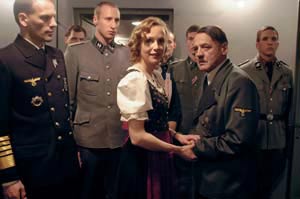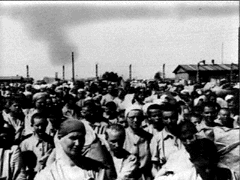
I wanted to title this, "Bruno Ganz Is Hitler!" but no one (I give a tinker's damn for) would want that said about him, even if he did play Hitler in 2004's Der Untergang (Downfall)--and with documentary precision, in a completely invisible "performance" that looked more like the "trite facts" of history than a movie. But the facts are only the beginning. In his book, Re-Thinking History, Keith Jenkins makes the epistemological assertion that "through hindsight, we in a way know more about the past than the people who lived in it." Shine on, you crazy historiographer. Downfall seems to run with Jenkins' statement, smoothly, surely, confidently, leaving me exhausted after hauling Hitler's final days in the bunker across the blasted heath of the second half of the twentieth century--blasted, I hope we know, more by Der Feuher than anything else (before the globalized market, of course; but that's for another blog)--and laying them at my feet, clear and cold.
 OK, so maybe Bruno Ganz is Hitler. At the least, he draws your eye inextricably--although one should note that Hitler has that ability; he was, of course, the programming bedrock of the young History Channel, before it discovered sex. Still, Ganz is impossible to ignore. I recall Christopher Walken discussing Danny DeVito when they worked together on Batman Returns (1992). He was commenting on DeVito's portrayal of the Penguin, and how silly it all could've been, but that the real strength of an actor is in the eyes; and, according to Walken--and I think he's right--DeVito had the Penguin's eyes. No Danny left, just that snapping, slobbering ball of damp rage. Ganz does Hitler like this, all the way to the eyes, which makes sense: Hitler and the Penguin have a lot in common, especially the sense of abandonment and isolation, and, as hammered into our skulls again and again in Downfall, the will to be cruel.
OK, so maybe Bruno Ganz is Hitler. At the least, he draws your eye inextricably--although one should note that Hitler has that ability; he was, of course, the programming bedrock of the young History Channel, before it discovered sex. Still, Ganz is impossible to ignore. I recall Christopher Walken discussing Danny DeVito when they worked together on Batman Returns (1992). He was commenting on DeVito's portrayal of the Penguin, and how silly it all could've been, but that the real strength of an actor is in the eyes; and, according to Walken--and I think he's right--DeVito had the Penguin's eyes. No Danny left, just that snapping, slobbering ball of damp rage. Ganz does Hitler like this, all the way to the eyes, which makes sense: Hitler and the Penguin have a lot in common, especially the sense of abandonment and isolation, and, as hammered into our skulls again and again in Downfall, the will to be cruel.Speaking of cruelty, it's interesting that Downfall runs more than half its length before Hitler says anything about Jews. And when he does, it is with the calm satisfaction that he did one thing right: He cleaned Germany's house. One less thing, as Forrest Gump might say. And the more we watch, the more we see Hitler tallying the six million-plus score, adding it all up--then watching it slip away. As he does so, he goes perfectly insane, cursing everyone, except the women and children. These he takes with him to Valhalla.
Except Traudl Junge, Hitler's secretary, who died in 2002 and frames the film. She gets the last word: "All these horrors ... these six million Jews ... who perished ... shocked me deeply. But I hadn't made the connection with my past. I assured myself with the thought of not being personally guilty. And that I didn't know anything about the enormous scale of it. But one day I walked by a memorial plate of Sophie Scholl in the Franz-Joseph-Strasse. I saw that she was about my age and she was executed in the same year I came to Hitler. And at that moment I actually realized that a young age isn't an excuse. And that it might have been possible to get to know things." The English phrasing of that last sentence is fitting. Junge proves Jenkins' argument via autobiography and hindsight: she not only lived through it, but lived long enough to finally get to know it.
I've read that the film has been criticized for "humanizing" Hitler. According to an April, 2005 posting on Studio Briefing, "Efraim Zuroff ... of the Simon Wiesenthal Center, said he had no plans to see it. 'I normally prefer that censorship not be employed in issues like this,' Zuroff said. 'I would hope people will vote with their feet and prefer not to see the movie.' This makes sense; Hitler's blood-smear has darkly marked the Jewish lintel, inviting not Passover but one plague after another. You'd think the last thing we need is to see Hitler agonistes.
 But I return to the Penguin. Bruno Ganz "humanizes" Hitler in the sense that he allows us to see the arch-nemesis all the way down to the eyes. Let me admit that as a pure performance it's remarkable. Ganz could have been playing any last-days dictator and he would have been irresistible. But we cannot ignore that he is portraying Hitler, assertively, with a bunker witness present. Given that, I still believe one has to look into those eyes, that a filmed performance can allow us to "get to know things," not the least of which is the mess Hitler made on history's floor, one we're still cleaning up after.
But I return to the Penguin. Bruno Ganz "humanizes" Hitler in the sense that he allows us to see the arch-nemesis all the way down to the eyes. Let me admit that as a pure performance it's remarkable. Ganz could have been playing any last-days dictator and he would have been irresistible. But we cannot ignore that he is portraying Hitler, assertively, with a bunker witness present. Given that, I still believe one has to look into those eyes, that a filmed performance can allow us to "get to know things," not the least of which is the mess Hitler made on history's floor, one we're still cleaning up after.
No comments:
Post a Comment